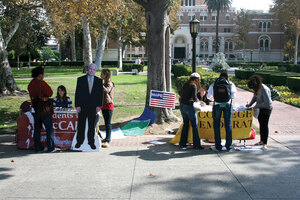One year after popular election, political activism on campus lags
Although political activism at USC has fallen since the wave of excitement and participation that propelled Barack Obama to the presidency last Election Day, momentum is expected to grow as the race for governor in California gets underway in the coming year.
Press coverage during last year’s election often highlighted youth involvement as a distinguishing characteristic of the election. USC’s campus also saw a heightened level of student involvement with dozens of panels and rallies, but the political activity has mostly died down in the year since the election.

Politicking · Students table on Trousdale Parkway for candidates during the 2008 presidential elections. USC’s campus has seen a drop in political activity since then. - Mike Lee | Daily Trojan
“It’s only natural that there’s going to be a much greater level of enthusiasm and participation during a campaign as opposed to afterward,” said Dan Schnur, the director of the Jesse M. Unruh Institute for Politics.
The leaders of various political groups on campus said the presidential election brought out political activism on campus because of the feeling students have that their actions would had an actual impact.
“A lot of people that were previously apolitical got more involved because they felt like this is the time to get involved,” said Alexa Ekman, USC College Republicans president.
Aja Heisler, external communications director for USC College Democrats, also said students were more inclined to support people during elections than issues.
“It was to be expected that interest as well as activism on campus would decrease after the election,” Heisler said. “Elections are what get people really passionate.”
Between elections, though, the level of political activity tends to focus on issues, which can often lead to smaller student turnouts.
“After a year, people don’t care that much anymore,” said Lisa Zhao, vice chair of USC’s chapter of the California Public Interest Research Group, a bipartisan organization that focuses on legislative issues. “It’s not a long-term thing.”
Still, despite less involvement, a number of organizations continue to hold political events on campus in an effort to encourage involvement.
Over the next week, USC’s campus will see a discussion about Obama’s first year in office` organized by the Unruh Institute of Politics, a Proposition 8 open mic sponsored by the Gay, Lesbian, Bisexual and Transgender Assembly and a USC College Republicans event featuring political writer David Horowitz.
“During this past year, a lot of students have seemed to get really passionate about the issues that Obama has presented,” said Yvette Ferrer, executive board member of the Political Student Assembly, which regularly sponsors political events on campus. “Slowly, we’re starting to see more political organizations and students taking pride in issues and making sure that their voices are being heard.”
And with the gubernatorial election approaching, USC is once again likely to experience a spike in student involvement, Ferrer said.
“Every time an election is going to happen, there is going to be an increase of political activism,” she said. “Probably within the next two months, we’ll see an increase in people wanting to be involved and head these student groups — we don’t even have Students for Whitman and Students for Poizner yet.”
Even though next year’s election will be more relevant to in-state students, Ferrer, who is from Texas, said the controversial propositions that were voted on last November and the state budget crisis could still capture student interest.
According to Schnur, gubernatorial campaigns don’t usually achieve the same level of excitement as presidential ones, but USC will still see more political involvement.
“As the 2010 governor’s race kicks into full gear, my guess is you’ll see a very pronounced increase in the level of political activity on campus,” he said.
The only student group founded to support a gubernatorial candidate was Students for Gavin Newsom, though the candidate recently dropped out of the race.
“Now that Newsom’s not running, there are rumors that other Democrats will get in the race as well. As the field of candidates finalizes, the level of student involvement is going to grow,” Schnur added.

how is politics defined this narrowly as what democrats or republicans do??
what about all the work of students for justice in palestine???